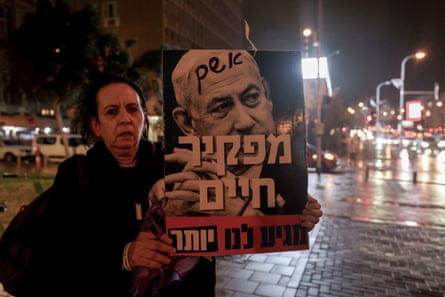Hostages’ families heckle Netanyahu as he warns Israel ‘expanding’ Gaza fight
Israel’s prime minister, Benjamin Netanyahu, has said the offensive in Gaza “isn’t close to finished”, as he faces heavy domestic pressure to reach a deal to bring home the more than 100 Israeli hostages thought to remain in captivity in Gaza.
“We are expanding the fight in the coming days and this will be a long battle,” Netanyahu said after visiting Gaza on Monday, according to a statement from his Likud party.
As he vowed to continue the war during a speech in parliament, relatives of the hostages interrupted him and called for their immediate return. “Now! Now!” they shouted.
Families who have been awaiting their loved ones’ return after 80 days in captivity booed the prime minister, as Netanyahu said Israeli forces needed “more time” to increase military pressure on Hamas, which he argued would help to secure the captives’ release.
Later, protesters gathered near the defence ministry headquarters in central Tel Aviv before a war cabinet meeting, holding posters demanding “Free our hostages now – at any cost!”
On Monday, the opposition leader, Yair Lapid, said Israel needed to “bring the hostages home now”, adding: “We are not doing enough.” His comments were met with applause from the families of hostages.

The rising death toll of Israeli soldiers from the ground operation has also threatened to undermine public support for the war. The Israeli military announced the deaths of two more soldiers on Monday, bringing the total killed in the war to 156.
Israel has been under pressure from its closest ally, the US, to lower the intensity of operations in Gaza and reduce civilian deaths.
Israel declared war in response to the 7 October attack by Hamas on Israel. The Palestinian militant group killed 1,140 people and seized another 240 as hostages. More than 20,400 Palestinians have since been killed in Gaza, according to its Hamas-run health service.
More than 100 people were killed in Israeli airstrikes late on Sunday in Gaza, including at least 70 in bombings that hit a residential block in the Maghazi refugee camp near Deir al-Balah, health officials in Gaza said. The Israeli military said it was reviewing the Maghazi incident.
Despite a long-awaited UN security council resolution on Friday that called for urgent action from all parties to work towards a ceasefire, fighting on the ground has intensified since the collapse of a seven-day truce at the start of December.
Early on Tuesday, Palestinian residents reported several airstrikes near Nasser hospital in Khan Younis, the largest medical facility in the southern Gaza Strip. Palestinian health officials said seven people were killed in an Israeli airstrike on a house in al-Amal neighbourhood in Khan Younis.

Meanwhile an Egyptian proposal to end the war was given a cool public reception by Israel and Hamas.
The three-stage plan would entail an initial cessation of hostilities for at least a week and the release of all remaining Israeli civilian hostages held in Gaza; then a week in which female soldiers would be released in return for Palestinian prisoners in Israeli jails; and finally a month-long negotiation period for release of male soldiers in exchange for Israeli withdrawal.
On Monday night it was reported that Hamas and Islamic Jihad had rejected the Egyptian proposal. The Israeli war cabinet was said to be discussing the Egyptian proposal.
Writing in the Wall Street Journal on Monday, Netanyahu outlined his “three prerequisites for peace”, which included the destruction of Hamas, the “demilitarisation of Gaza” and the “deradicalisation [of] Palestinian society”.
In the op-ed, he said that once these goals were achieved, “Gaza can be rebuilt and the prospects of a broader peace in the Middle East will become a reality”.
Reuters and Agence France-Presse contributed to this report